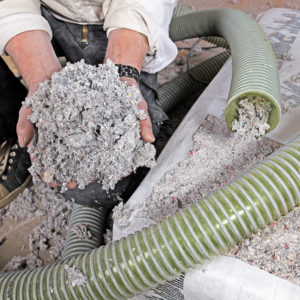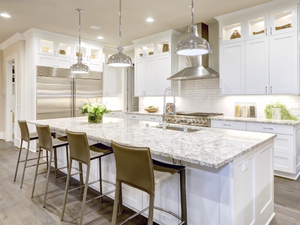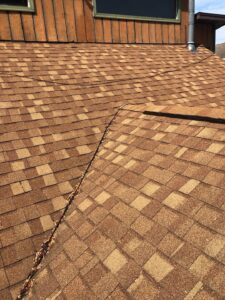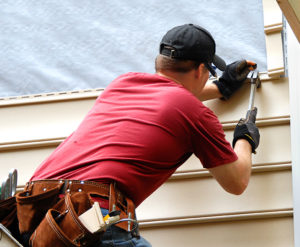Replacing your roof is an investment, but it can pay off in the long term. Let’s take a look at what you can expect when you commit to a full roof replacement.
Table of Contents
Replacement Roofs vs. Repairs
Should I Repair or Replace My Roof?
Repairing your roof can be an attractive option versus a full replacement: it’s a fast, cheap solution to minor damage. However, a complete roof replacement may save you more money in the long run, depending on a few factors:
- Age: If your roof is nearly 20 years old, it may be time for a replacement. Conversely, if your roof was just installed a year ago and is already having problems, it may be better to replace the poorly-installed roof than continually patch it.
- Damage: Major damage to your roof doesn’t make financial sense to repair. At a certain point, it’s more cost effective to replace a leaky, buckling roof than to try to fix it.
- Natural disasters: High winds accompany some of nature’s worst disasters, from tornadoes to hurricanes. If you live in an area prone to damaging winds and strong storms, a roof replacement may be a worthy investment to protect your home.
- Aesthetics: It can be difficult to match the color of shingles when making a repair. Even if you have the same brand, your roof’s color will have likely changed after being exposed to the elements. Repairing a large area of your roof with off-color shingles may decrease the value of your home, making a complete replacement the better option and often covered by your insurance.
How to Save Your Roof in an Emergency
If you’ve suffered a roofing emergency, call an emergency roofing contractor immediately. Roofing emergencies involve damage that compromises the integrity of the house or allows water inside, such as:
- A tree falling on your roof
- A storm ripping multiple shingles off of your roof
- Your roof sagging or buckling due to moisture damage
- More than two leaks in the house
Emergency roofers can engage in a quick repair or tarp over damaged areas to protect your home from the elements. Depending on the extent of the damage, it may not be safe for your family to remain inside until the roof has been completely repaired or replaced.
Legacy is trained and certified to work with your insurance company to ensure your best interest for any exterior and interior damage covered by your insurance.

How Much Does a New Roof Cost?
According to Home Advisor, the average cost of a roof replacement in Michigan is between $6,500–$11,900. However, the exact cost for your new roof will depend on specific factors, such as the:
- Size of your roof
- Pitch or slope of roof
- Any existing warranties
- Quality of materials
- Type of shingles, tiles, or other materials
- Quality of contractor
- How long it takes to remove the existing roof
- Ease of accessibility to roof
- Cost of any necessary permits
- Any necessary repairs to existing damage
Will My Insurance Cover My Roof Replacement?
It depends on why you’re replacing your roof in the first place. Typically, your insurance will cover damage such as wind damage or hail damage. This is why it is important to have inspections completed by Legacy Roofing and Restorations. If your roof has simply reached the end of its life, you’ll likely be responsible for some or all of the cost of replacing it.
Even if your insurance will cover your roof replacement, you’ll need to pay your deductible before your coverage goes into effect.

What Type of Roof Should I Buy?
Once you have decided to replace your roof, there are many options to choose from. The four major categories are metal, shingles, solar, and flat roofs.
1. Metal Roofs
Metal roofing can last more than twice as long as asphalt shingles—and comes with the price tag to prove it. With an expected lifespan of up to 70 years, metal roofs can cost two or three times more than traditional ones. However, you might be able to offset the cost with energy savings: metal roofing reflects sunlight, decreasing your energy bill by up to 25%.
2. Shingles
Shingles are the traditional choice for roofing a home, and asphalt shingles are one of the most popular and cost-effective options. They come in three varieties:
- 3-tab shingles: Simple, flat, and affordable. They’re also known as strip shingles.
- Architectural shingles: Consist of multiple layers of asphalt, creating a more multidimensional look. Architectural shingles are more durable than strip shingles. They’re also known as dimensional shingles or laminate shingles.
- Designer shingles: Based on the dimensional style but are even more durable. Designer shingles mimic the look of more natural roofing materials like slate or wood. They’re also known as luxury shingles.
Beyond asphalt, you can also get shingles made of other materials, including:
- Wood
- Clay
- Slate
- Composite
- Concrete
3. Solar Roofs
Solar roofs aren’t just a futuristic dream anymore—they’re here and available now. You can generate your own energy for your home with an environmentally-friendly, renewable resource, and even qualify for some tax credits in the meantime. If you choose to go solar, you can install long panels on your roof or smaller solar shingles to give the impression of more traditional roofing.
4. Flat Roofs
Flat roofs are an iconic architectural choice in more urban areas. Although called flat roofs, they still have a small slope to allow for proper drainage. Still, rain and snow will accumulate for long periods of time on flat roofs, requiring more water resistant materials than a traditionally shingled roof.
Commercial vs. Residential Roofs
Commercial roofs are different from the residential roofs purchased by homeowners. Typically, commercial buildings have flat roofs that are strong enough to house heavy materials such as HVAC equipment or external pipes. If your business needs a roof replacement, make sure to hire a roofing contractor that’s experienced with the complexity of commercial roofs.

How to Find the Right Roofing Contractor
Getting a roof replacement is no small task. You’ll want to work with a contractor you can trust to get the job done right. Here are a few tips for finding the right roofing contractor for your replacement:
- Start local: Ask your friends for some referrals for local, well-established contractors. You’ll want to make sure the business has a history of being trustworthy and providing high-quality service. If the business is new, see what kind of awards or honors their work has earned. For example, Legacy Roofing & Restorations has been in business for more than 35 years and was chosen in 2020 as one of the top roofers in Grand Rapids, MI.
- Make sure they’re licensed: Michigan requires roofing contractors to be licensed. You can verify your roofing contractor’s license number here via the Department of Licensing and Regulatory Affairs (LARA) website.
- Check for insurance: Your homeowners insurance may be paying for some or all of your roof replacement, but did you know that your roofer needs to hold insurance as well? Your roofing contractor needs to have adequate insurance in case they or their employees are injured on your property. Ask your contractor for proof of insurance before they ever set foot on your roof. Don’t trust any contractor who offers to work “around” your insurance—this is illegal.
- Read reviews: Online reviews can provide great insight into what it’s like to work with your roofing contractor. Are most of the reviews positive? Do they include phrases like “good communication” or “fair price”? Or are they mostly one-star, negative reviews? You can find reviews for Legacy Roofing & Restorations on Google, BBB, Angie’s List, and Home Advisor.
Frequently Asked Questions (FAQs)
How Long Should My Roof Last?
The lifespan of your roof depends on the type of materials used, their quality, and the quality of the roof installation. A traditional asphalt roof should last 15–20 years. Roofing materials sold by Legacy Roofing, such as GAF, may last double or even triple that.
How Much Should I Pay to Replace a Roof?
In Michigan, you can expect to pay roughly $6,000–$12,000 for your roof replacement, depending on the quality of your roof, the quality of your contractor, and the difficulty of the job.
How Often Should You Replace a Roof?
You should try to get as many years out of your roof as possible. It’s typically more cost effective to repair a roof in the early years than replace it. However, you should expect to replace your roof every 15–20 years.
How Long Does a Roof Replacement Take?
Ask your contractor for a specific estimate for the length of your roof replacement, taking into account the size of your roof, the type of materials that will be used, and the difficulty of the job. Generally speaking, a typical roof replacement can take anywhere from one day to one week.







